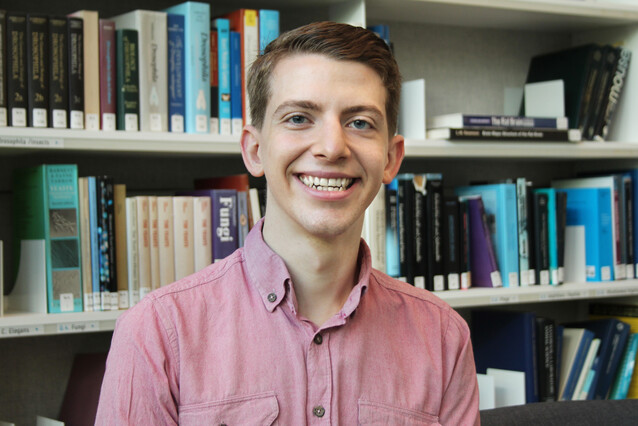Lauwers Award for Josef Roehsner
Josef Roehsner, PhD student in the lab of Andrea Pauli, wins this year’s Lauwers Award for his excellent presentation during a Vienna BioCenter Monday Seminar. In this interview, he tells us more about his scientific journey.
What was your trajectory to the IMP?
I studied at the University of Vienna and was looking for a good place to conduct the research required for my bachelor’s thesis. I randomly met a PhD student from the lab of Luisa Cochella, and he told me they were looking for an undergraduate student to run a small project. I applied and got the position. The project only lasted six weeks, but I immediately fell in love with the place.
So you came back?
After graduating, I started my master’s, and after I’d finished my coursework, I came back to the IMP for a year of research. I returned to Luisa’s lab and continued working with small RNAs in the nematode C. elegans. For my master’s thesis later on, I stepped out of my comfort zone, both academically and geographically.
Where did you go?
I went to Amsterdam, to the Netherlands Cancer Institute to investigate DNA damage in breast cancer. A very different world! I loved the topic, and the quality of research was high, but the Vienna BioCenter was a much better match for me, mostly because of the level of collaboration between labs, which I haven’t seen elsewhere.
How did you choose your supervisor at the Vienna BioCenter?
Luisa had already left for Johns Hopkins University. Initially, I wanted to either delve deeper into small RNAs or investigate molecular mechanisms of cancer. During the interview process, however, I started talking to Andrea Pauli and her lab members, and that was a revelation. The project idea was fascinating, and the work environment in the lab seemed both friendly and productive. It was a perfect fit on all sides, so I left my comfort zone again, working in a very different field.
Tell us more about your project.
My project builds up on a recent publication co-led by Laura Lorenzo-Orts and Frieda Leesch, who discovered how ribosomes are stored and kept inactive in the zebrafish egg. Together with colleagues in the Haselbach lab, they found that four conserved factors bind ribosomes, thereby stabilising them and keeping them inactive, forming what we call ‘dormant ribosomes’. The primary goal of my PhD is to figure out how ribosomes are released from this dormant state for translation to kick-start during early embryonic development.
Is this phenomenon restricted to eggs?
That’s another important aspect of my project. I’m investigating whether the function of these factors is conserved in other cell types. I’m now collaborating with several labs on campus to explore that question in somatic cell types in mammals. I hope to uncover general principles of translation regulation.
What does the Lauwers Award mean to you?
In my opinion, the true potential of scientific research is only unlocked once it’s effectively communicated. Science communication is very important to me, so this recognition feels special, even more so because it comes from the local scientific community. When I was working in the Cochella lab, two PhD students were mentoring me – one of them was Paula Gutiérrez Pérez. Paula was a real role model for me and won the award in 2020. Receiving the award this year felt like it was staying in the family. In addition to that, there’s a strong emphasis on presentation skills in my current lab. Andrea is even teaching scientific presentation skills to students in the Vienna BioCenter PhD Program, so we’re really given the tools to give engaging talks.
About the Mattias Lauwers Award
The award is named after the late Mattias Lauwers, a talented young PhD Student in the group of David Keays, who tragically died in a sports accident in 2014.
The Lauwers family created the award. The criteria for it aim to reflect Mattias’ dedication to research and presenting it to peers and colleagues, and the selection process draws from both peers and mentors: the students of the Vienna BioCenter PhD Program nominate who they consider the best speaker, and based on these nominations, the Steering Committee selects the laureate. The Lauwers family traditionally presents the award at the Vienna BioCenter PhD Symposium.
